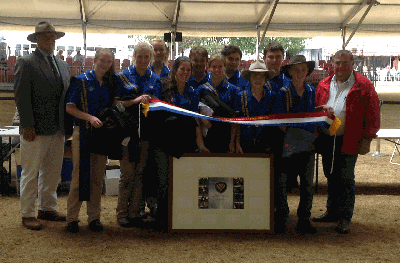
This dairy youth competition is called the "Semex Dairy Youth Challenge." Teams of 10 members compete against others from across the continent. There are three phases to the contest.
In the first phase, four members from the team are assigned a heifer to clip. The heifer is restrained in a clipping chute and the team has 30 minutes to prepare the animal. They are judged not only on the heifer's appearance, but the cooperation, communication and teamwork they display while clipping. Safety is also important as judges consider electrical cord management and the youths' awareness while clipping to ensure that they are avoiding potentially dangerous positions. (All of the heifers were well-mannered.) After clipping, one of the four teammates leads the animal in a circle where two judges evaluate the fitted heifers. The clipping chutes are removed and new animals are brought to ringside.
In this second phase, three new team members lead (parade) three heifers in unison in a large circle around the ring for 15 minutes. They are led side by side. If one heifer does not want to move, the other two stop so the third can catch up. Then they proceed to parade in unison with the other teams following behind. They are evaluated on how they present the animals, including uniform leading and communication between teammates.
The three team members who have not competed yet, are part of the third phase, the judging portion. While many U.S. contests have multiple classes where youth judge classes independent of others, this contest is about teamwork. One class is used in the judging portion. In this particular case, it was a 2-year-old Holstein class. The three team members discuss the class among themselves and submit one placing card. Once all teams have turned in cards, one team member from each team is taken away from the arena. Then, one by one, each returns to the arena, where they are given the microphone to announce their placing and deliver reasons to the audience. The cows are then arranged in the order they placed them. Judges evaluate their reasons and delivery, but not necessarily the placings, which was scored separately. The next team representative then enters the show ring to deliver their reasons.
At the conclusion, teams gather in the center of the ring to hear the results of the morning's activities. Clipping is valued at 100 points, parading is 50 points and judging is 50 points. Starting with ninth place, each team member receives a sash (large ribbon), a gift pack containing hats, show supplies and jackets, depending on their placings. The top three teams also receive medallions. Encouragement awards are also given which included new sets of clippers to three contestants.
This contest focuses on teamwork and gives youth the opportunity to showcase on their specific area of dairy interest, while still contributing the team's overall performance. Who knows, maybe modifications of this contest might find its way to North American shows some day. More photos of the contest activity can be found here.






